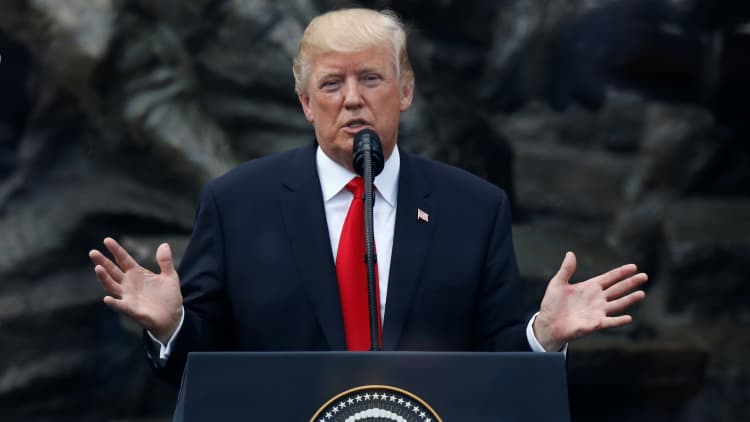A slew of negative headlines about the Trump administration's relationship with Russia could delay tax reform, hitting the U.S. dollar, Credit Suisse said Monday.
"The prospect of legislative paralysis as a result of these controversies may weigh further on the USD," London-based Credit Suisse analyst Honglin Jiang said in a note titled, "Trump faces new criticism over Russia."
Last week, during the G-20 meeting in Germany, President Donald Trump met with Russian President Vladimir Putin for the first time since the U.S. election. Trump's focus on moving the two countries' relationship "forward" rather than pressing Putin on Russia's interference in the U.S. election drew the criticism of John McCain and other prominent Republicans.
Then over the weekend, Trump's eldest son, Donald Trump Jr., said he met in June 2016 with a Russian lawyer who offered damaging information about then-Democratic candidate Hillary Clinton. In a statement, Trump Jr. said the lawyer's "vague" statements "made no sense" and that his father "knew nothing of the meeting or these events." Music publicist Rob Goldstone told The Washington Post he had arranged the meeting at the request of a Russian client and had attended it.
Questions about ties to Russia have swirled around the Trump administration for months, from document leaks to the resignation of Michael Flynn as National Security Advisor. The latest reports could further distract the Republican majority in Congress, a concern for markets waiting for tax reform.
The U.S. dollar index surged to a 14-year high following Trump's election as traders bet the new administration's pro-growth policies would strengthen the U.S. economy. However, delays in passing a new health-care bill pushed out expectations for tax reform, pressuring the U.S. dollar. The Senate is expected to vote on health care by August.
The U.S. dollar index traded little changed near 96.06 Monday, down nearly 2 percent since the election and off 6 percent year-to-date.
That said, a major weight in the dollar index, the euro, has strengthened in the last several weeks after the European Central Bank signaled monetary policy could begin tightening soon. The euro traded near $1.140 Monday, just off a June 30 high of $1.1445 that marked the highest in more than a year.
The U.S. dollar strengthened Monday against the , hitting a near 2-month high of 114.29 after Bank of Japan Governor Haruhiko Kuroda reiterated the central bank will keep monetary policy easy until inflation can stay above the 2 percent target.
Credit Suisse expects the euro-dollar will climb to $1.150 in the next three months and stay there for the next 12 months. The firm expects the yen to strengthen to 110 against the dollar in three months, and 107 in the next 12 months.
— CNBC's Gina Francolla and Reuters contributed to this report.



